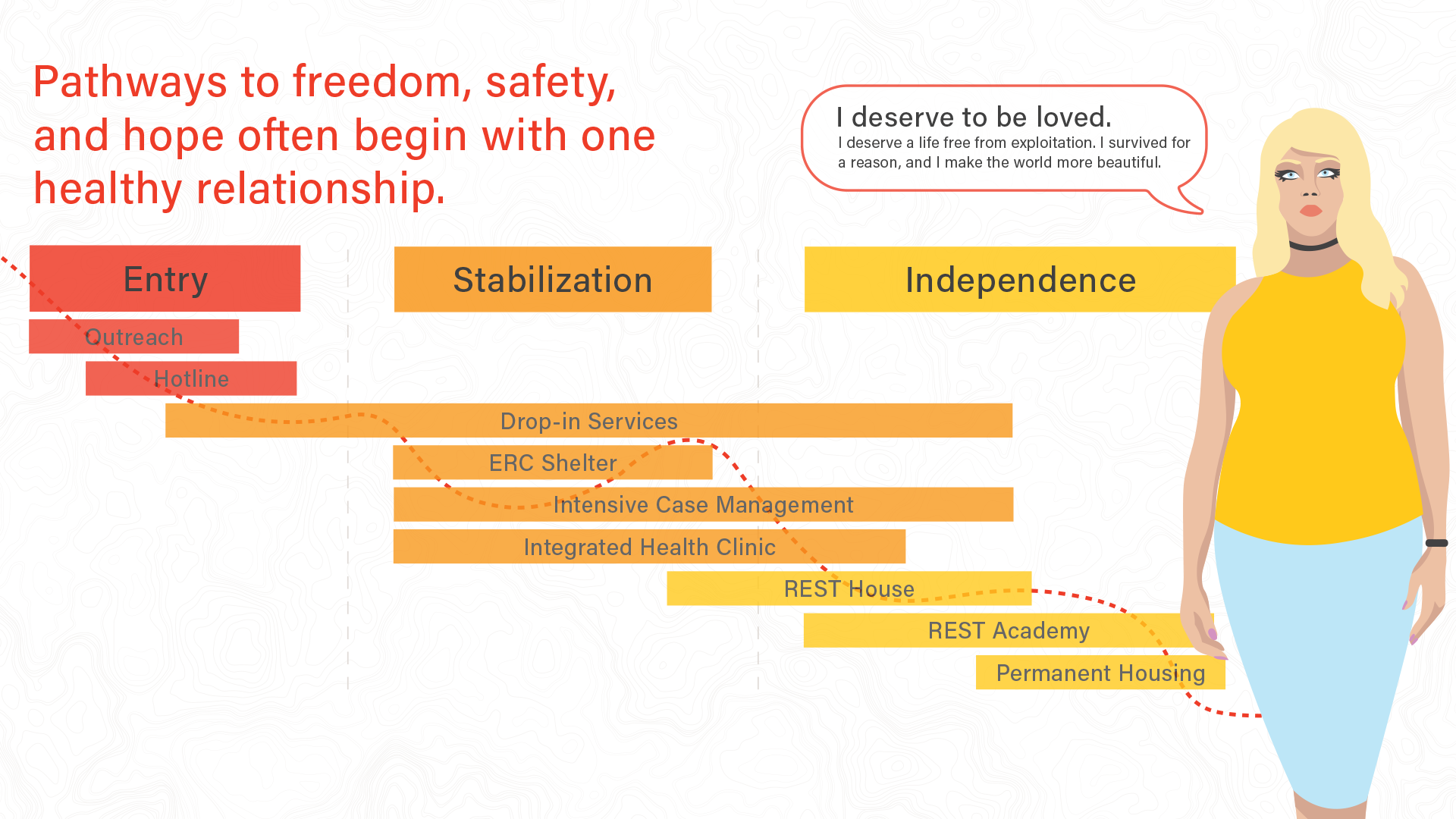Pathways to freedom, safety, and hope often begin with one healthy relationship.
We know it can take one toxic relationship to lure someone into the sex trade, and it can take one healthy relationship to begin the journey out. At REST, we seek to be that new healthy relationship, focused on unconditional care and rooted in love, while we walk alongside victims and survivors of sexual exploitation as they begin to explore and find their pathways to freedom, safety, and hope.
How does REST meet victims and survivors of the sex trade?
The relationship often begins through our Outreach Team, or through our 24/7 Emergency Hotline.
The REST Outreach Team reaches out to survivors in two primary ways: through text messages, and through a feet-on-the-ground team that goes out into the streets of Seattle.
In FY21, we sent 8,327 texts to potential victims of trafficking through Freedom Signal—a software that scrapes numbers from sex ads online and was developed out of a partnership with Microsoft Hackathon volunteers and Seattle Against Slavery.
Each text message contains an offer of services and a message of hope for potential victims.
Our Street Outreach team had over 218 interactions with individuals being exploited on the streets of North Seattle. By offering nonjudgemental relationships, food and hygiene items, and information about our services we share, “You are seen and we care.”
The REST Hotline
The hotline is available 24 hours a day, seven days a week. Skilled team members respond to calls, texts, or emails from individuals who are in need of assistance, or service providers and law enforcement who would like to make a referral. Through the hotline, we can provide emotional support, safety planning, and assist survivors to connect to the services they need.
377 unique survivors called the REST 24/7 Hotline
1,936 calls received
748 texts received
Because of the COVID-19 pandemic, we relied more heavily on the hotline this year to coordinate and connect with current clients.
Meet Jackie.
Jackie is the Community Advocate Supervisor at REST, a survivor of sexual exploitation, and has been on staff for five years.
When Jackie was introduced to REST five years ago, it was through a friend and fellow survivor who invited her to join Thrive, REST’s survivor support group. At the same time, it was mentioned that REST was working on opening a shelter, and there may be positions opening up.
““I came in for my first [support group] and was completely hooked. I was welcomed with open arms. It was nice to be able to identify with other people’s feelings and not feel like I was alone. There was this opportunity to talk about some really, really raw things and also being able to honor them. I think the society we’re in is always pushing down the bad or the negative. But really in all honesty we have to get it out. We need to talk about it for it to even be addressed as something we need to heal from and so I just think REST and our support group at that time really offered me that.””
Shortly thereafter, she applied and was hired as the Survivor Engagement Specialist on the inaugural team for REST’s Emergency Receiving Center Shelter. In the five years she’s been with REST, she’s also served as the Outreach Coordinator, often being the first person at REST who survivors encounter, is currently overseeing REST’s team of Community Advocates and Outreach efforts, and is on REST’s Leadership Team.
Her breadth and depth of experience at REST, as well as her experience of being a survivor herself, gives her a unique perspective and ability to be able to understand the needs of survivors and create solutions that address the individualized needs of each client that she and her team encounter.
Jackie’s work—in all of the positions she’s held at REST—is about building trust and creating a safe space for victims and survivors of sexual exploitation to begin to explore their options. In time, that safety and trust combined with effective services leads to a greater sense of self-efficacy and empowerment.
““That’s what I live for. That is what I live for and that is why I’m here five years later because I see it all the time... You see this metamorphosis of an individual… It’s seen in their mannerisms, the way that they advocate for themselves, the way that they go after what they want, the way that they’re able to identify what they want. It’s so beautiful.
To watch them go from this place of hopelessness and despair to now they are inspired and motivated and feeling good and, and getting up and saying ‘This is what I want and it matters. This is what I like and it matters. This is who I am and it matters.’””
At the same time, the work is challenging—sometimes, Jackie and her team are simply unable to meet all of the needs of every client.
““The hardest part of this work is when we feel like we don’t have the answers or we aren’t able to do the things that we need to do... When my survivor siblings hurt, I hurt… There are days when I go home and say [to myself], ‘How can I do more?’ Then I battle with myself—I have to have grace and compassion [for myself] that I’m not always going to have the answer or we’re not always gonna have access. But also—how do we still show up to care for individuals?””
Even amidst the trials and challenges of not being able to meet every need all the time, there is pervasive hope intertwined in the work at REST.
““I have watched so many people go through their journey—good, bad, ugly, sad. And that gives me hope. That we are still here thriving and growing and able to raise our capacity to serve, right? I think what gives me hope is that people are in support of this work. I think that gives me hope that a place like REST exists...
It gives me hope that our whole organization has continued to show up through the pandemic. This has been, honestly, the roughest year that we’ve had in a long time. There’ve been more referrals than we can actually take. But it gives me hope that we’re still here and even through the ups and the downs, we’re flowing. And we’re still able to say ‘No matter what, this community matters.’””



